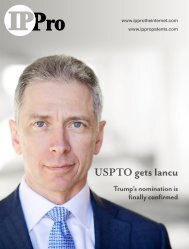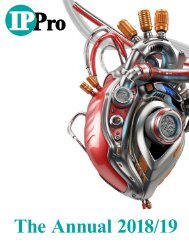IPPro Issue 002
IPPro is the go-to industry publication for news, views, and opinion on patent practice, law and management. The fortnightly publication and accompanying website - the only free-to-read intellectual property resource around - cover the full spectrum of IP law globally, including prosecution, litigation, licensing, management and technology.
IPPro is the go-to industry publication for news, views, and opinion on patent practice, law and management. The fortnightly publication and accompanying website - the only free-to-read intellectual property resource around - cover the full spectrum of IP law globally, including prosecution, litigation, licensing, management and technology.
You also want an ePaper? Increase the reach of your titles
YUMPU automatically turns print PDFs into web optimized ePapers that Google loves.
Artificial Intelligence<br />
The US must embrace the AI revolution, or its global lead in intellectual<br />
property will be lost in time, like tears in rain<br />
The primary source of global intellectual<br />
property internet news and analysis<br />
Barney Dixon reports<br />
Schuster explains that ‘to invent’ means to “identify a certain and<br />
permanent conception of the invention as it will be used”.<br />
Artificial intelligence (AI) sounds cool. When you look at the breadth<br />
of fiction attached to the technology, you might consider it the<br />
impossible—the fantasies of authors and writers around the globe. It<br />
is this air that gives it its identity and its mystique. But AI is very much<br />
here, and with that, comes a particularly unique set of problems.<br />
As Russian president Vladimir Putin once said, “the nation that leads<br />
in AI will be the ruler of the world”. Leading in something means<br />
leading in its every single aspect, including, in this case, setting<br />
standards regarding AI and patent law.<br />
For the US, a country that is currently in the midst of a potential<br />
patent downturn, due to what some critics have called a “weakened<br />
IP system”, headlining in AI patent policy could be important to the<br />
continued premiership of the US patent system.<br />
“Providing information about the existing state of the art is not—<br />
standing alone—invention. Neither is simply identifying a goal to be<br />
achieved or employing another to achieve that goal,” he says.<br />
He adds: “This leads to the legal conclusion that, where a human<br />
solely identifies a goal and provides background information for AI to<br />
use in creating a new technology, it is the computer—not the human—<br />
who is the inventor.”<br />
An upcoming paper from Schuster specifically discusses this problem<br />
and the variety of types of AI capable of invention. For example,<br />
Schuster describes genetic algorithms as one such variant.<br />
He details algorithms that develop “new technologies by mimicking<br />
biological evolution”.<br />
Implementing AI poses an unusual set of issues for a national patent<br />
system, and not all are related to the actual patenting of AI itself. For<br />
example, if an AI were to invent something, does the patent belong to<br />
the AI itself, or the creator of the AI?<br />
Assistant professor Mike Schuster, of the Oklahoma State University,<br />
believes that these issues need to be addressed—one way or another—<br />
in the near future. He hopes that, when the time comes, sufficient<br />
information and research will be available to make an informed decision.<br />
Schuster says that invention by artificial intelligence is already here.<br />
He explains: “It has independently invented jet engines, parts of<br />
bullet trains, communication systems, and new pharmaceuticals.”<br />
These issues of invention and ownership are already out there, according<br />
to Schuster, who recounts that there are already reports of an individual<br />
who secured a patent on technology that he admits was invented by AI.<br />
“He did so without bringing the AI’s role as inventor to the US Patent<br />
Office’s attention,” Schuster says.<br />
28 <strong>IPPro</strong> The Internet<br />
“The AI creates multiple sets of random design parameters relevant to<br />
a subject technology,” Schuster illustrates, “it then tests each set for<br />
performance and discards poor performers.”<br />
“The survivors then create additional parameter sets by<br />
combining subsets of their elements to form hybrids (offspring).<br />
These sets are ‘mutated’ by randomly altering one or more<br />
parameters. The process repeats itself, beginning by testing the<br />
parameter sets for performance, until an acceptably performing<br />
design is reached.”<br />
You’ve done a man’s job<br />
Inventions developed by AI already exist and already, as Schuster<br />
explains, we have seen individuals claiming ownership for AI<br />
created inventions.<br />
So, in this new, strange territory, how should governments react?<br />
Should patents be owned by the AI itself? The purchaser of the AI?<br />
Or those that developed the AI in the first place?<br />
www.ipprotheinternet.com





